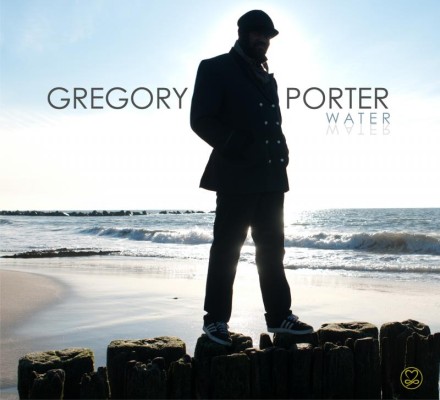Gregory Porter | Water
Gregory Porter | Water
by Peggy Oliver
It can be a blessing or a curse when a major sports injury can change life’s course; more often the former, of course. Gregory Porter was singing in clubs during his college days at San Diego State University. However, it was a shoulder injury while playing football that prompted him to further his music plans. A musician friend just happened to be looking out for this gifted jazz interpreter. Ever since Porter’s mother emphatically proclaimed he sounded like Nat King Cole, this was enough to impress him in checking out Cole’s catalog on a Playskool record player of all things. Multi-instrumentalist and composer Kamau Kenyetta mentored Porter in perfecting his craft. Kenyetta eventually extended an invitation to a recording session with flautist Hubert Laws. Coincidentally, that 1998 session was a tribute to one of jazz and pop music’s greatest gifts (Hubert Laws Remembers the Unforgettable Nat King Cole) with Porter featured on the bonus track – the international pop classic, “Smile.” In the studio at that time was another respected vocalist – Laws’ sister, Eloise – who was immediately captivated with Porter’s creamy baritone, an almost dead ringer of Cole. Needless to say, Porter joined Eloise in a Denver, Colorado regional stage production of It Ain’t Nothin’ But The Blues before the show landed on Broadway, where the NY Times raved about Porter’s performance. Yet the piece de resistance would be Porter’s dream; appearing, co-writing and starring in another Denver regional production: Nat King Cole & Me: A Musical Healing. With his foot solidly planted in musical theater and jazz clubs, this California-born, Brooklyn, NY resident had officially arrived.
With a ringing endorsement by his mother growing up, it was the ultimate compliment for Porter to have that endorsement seconded by jazz master, Wynton Marsalis. Besides his frequent contributions with Marsalis’ Lincoln Center Jazz Orchestra, he has established audiences in several countries, including Russia. Now Porter goes into the studio on a solo tip for his debut, Water (produced by Kenyetta), a superb jazz vocal workshop sprinkled with blues, gospel and funk overtones while arousing many levels of emotions in between. In fact, Porter’s heartfelt narratives throughout Water echo the essence of Nat King Cole & Me.
“Illusion” is a solemn piece about lost love in an exquisite duet with Porter’s baritone and pianist Chip Crawford. Porter’s haunting vocals surround “Lonely One,” where the subject matter speaks loudly about abusive love relationships. The soulful “Magic Cup” comes alive via a fun story-line of Porter’s love for coffee and a friend who works at a coffee shop, propelled with a caffeinated (all to the good) solo by saxophonist Yoske Sato. The title track (another inviting duet by Crawford & Porter) paints a vivid picture of how this wonder called H20 can cleanse green gardens and troubled souls. Certainly living through the civil right movement of the sixties struck a nerve for many. Powell revisits some of those moments, including the infamous Martin Luther King’s assassination, for the intense twelve-minute musical poem, “1960 What?”
Besides his original compositions on Water, Porter’s full-bodied voice easily handles the post-bop classic “Black Nile” by Wayne Shorter (highlighted by a confident scat break) and a gospel acapella reading of “Feeling Good,” written for the 1964 musical, The Roar of the Greasepaint – the Smell of the Crowd.
Water is an absolute must for lovers of jazz and otherwise, especially because of Porter’s vocal range and lyrical integrity. Maybe the sports world has lost a potential athletic talent, but the music industry has gained a much needed blessing.
Peggy Oliver
The Urban Music Scene
